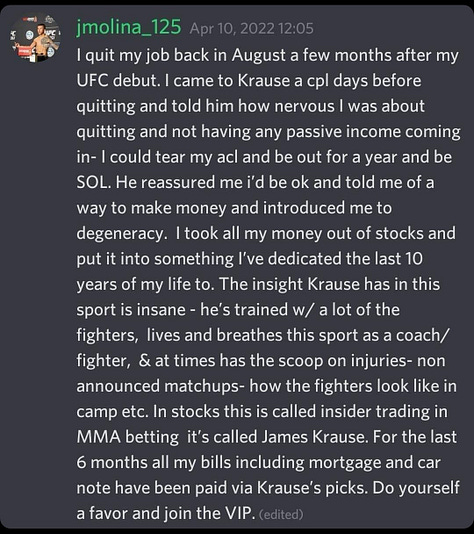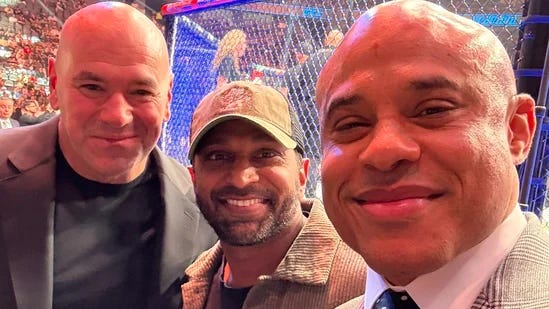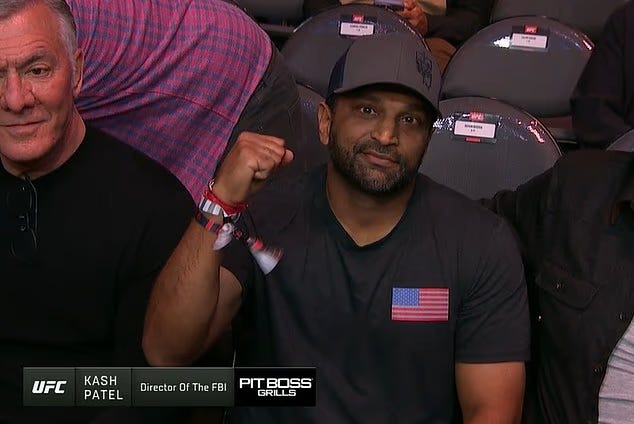The Ballad of the Fixed Fight
Another betting scandal is threatening the UFC's reputation. Yet with the FBI now headed by a Trump loyalist, any notion of a legitimate crackdown is not just improbable—it’s absurd.
Welcome to Sports Politika, a media venture founded by investigative journalist and researcher Karim Zidan that strives to help you understand how sports and politics shape the world around us. My mission is to offer an independent platform for accessible journalism that raises awareness and empowers understanding.
If you share this vision, please consider supporting my work by becoming a paid subscriber. I am currently running a special offer whereby you can secure a subscription at a 40% discounted price…forever.
I remember the first time I witnessed a fixed fight.
It was October 2015, and I was in Sochi, Russia, working as a colour commentator for M-1 Global, Russia’s oldest (and now defunct) mixed martial arts organization.
While there were rumours going around that Russia’s president Vladimir Putin might show up at the event—he was in Sochi celebrating his 63rd birthday by playing hockey with his favourite oligarchs—he never did. Instead, the guest of honour was Yunus-bek Yevkurov, the head of the southern Russian republic of Ingushetia, who was in attendance to watch one of his republic’s most popular fighters: Adam Yandiev.
Yandiev was no ordinary man. Built like an action figure brought to life, his muscles resembled tree trunks, bulging as he crushed opponents in punishing submission holds. But his dominance went beyond brute strength; Yandiev had cultivated a flair for the dramatic, entering arenas with a pro wrestler’s swagger, complete with a custom song, a music video, and a lengthy walk to the ring.
On this particular night, Yandiev was scheduled to face Dmitry Voitov, a Belarusian fighter boasting a 12-4 record. Few expected the undefeated Yandiev to struggle. Not a single one of his fights had ever gone past the first round. As it turned out, this fight would be no different.
I remember calling the action alongside UFC pioneer Ian Freeman. Yandiev exploded forward, throwing a relentless flurry of punches that had become a trademark of his arsenal. Voitov answered, trading blows in a chaotic, almost choreographed exchange. Then Yandiev dragged him to the mat, locking in a north-south choke. Voitov weathered the storm, biding his time, and slowly worked his way onto Yandiev’s back. Adam twisted and flipped onto his own back, somehow allowing Voitov to settle into mount.
It all started to feel staged. Yandiev regained top control briefly, only to end up back in mount under Voitov. And then… Voitov did the unthinkable: he stepped off the mount and stood up.
“He stepped off the mount???” Freeman’s voice cracked in disbelief.
“What is going on here??” I echoed.
Voitov’s next move—a deliberately slow, almost scripted takedown attempt—handed Yandiev the opening to reverse and lock in a neck crank for the win. Every moment felt calculated, as if the fight was unfolding according to someone else’s script.
“Well, that was a confusing fight, ladies and gentlemen,” I said, struggling to make sense of what we had just witnessed.
What made the incident especially controversial was that Yandiev wasn’t just another MMA fighter. his father, Alikhan, was one of the richest men in Ingushetia and one of M-1 Global’s key investors.
Freeman and I weren’t the only one who took notice of the fight. Weeks later, the Russian MMA Union, which regulates the sport in the Russian Federation, announced their intention to review the bout on suspicion that it had been fixed. The results were inconclusive and Yandiev has vehemently denied any wrongdoing.
“The lion does not look back at the dogs,” he said at the time.
The Yandiev incident was just one of many fixed fights that were taking place in Russia and across the sport’s landscape. The Yakuza were notorious for rigging bouts while controlling Pride FC in the early 2000s. More recently, match-fixing has emerged as a concern for the UFC as well, which faced its latest betting scandal this past weekend—a scandal that appears to have drawn unwanted attention from the Federal Bureau of Investigation.
During Saturday night’s UFC Fight Night event in Las Vegas, Isaac Dulgarian suffered a first-round submission loss to Yadier del Valle. The result quickly sparked outrage after reports of unusual betting activity surfaced, with a surge of wagers placed on del Valle to win in the first round, despite Dulgarian entering the bout as the betting favourite.
The UFC took notice, releasing Dulgarian from his contract and issuing a statement confirming that an independent betting integrity service was “conducting a thorough review of the facts.”
“We take these allegations very seriously, and along with the health and safety of our fighters, nothing is more important than the integrity of our sport,” the statement concluded.
This isn’t the first time that the UFC has faced a betting scandal. In November 2022, a similar incident took place in a bout between Shayilan Nuerdanbieke and Darrick Minner. Large wagers were suddenly placed on Nuerdanbieke to win by first-round knockout—a bet that paid off when Minner appeared to injure his knee seconds into the fight and was quickly stopped. Sportsbooks flagged the activity, and investigations were launched by regulators and integrity monitors.
At the centre of the storm was James Krause, a respected former fighter turned coach known for boasting about his gambling success. Through his online “1% Club” Discord group, he encouraged others to bet on MMA, openly claiming he made more money gambling than coaching or fighting.
According to screenshots provided to me by a former member of the 1% Club who wished to remain anonymous, the Discord server boasted several active UFC fighters encouraging other members to trust Krause’s tips.



As public scrutiny mounted, the UFC scrambled to contain the fallout. Minner was released from his contract. Fighters associated with Krause were suspended pending investigations. The promotion announced a review of its betting policies and began working with outside integrity firms to monitor suspicious activity.
But the scandal wasn’t just about one coach; it exposed deep flaws in how the UFC handles gambling and fighter welfare. While major sports leagues have strict rules preventing insiders from betting, the UFC had long allowed its fighters, coaches, and staff to wager on bouts. The organization had embraced partnerships with betting companies and promoted gambling as part of its fan experience, yet failed to build the necessary safeguards to prevent conflicts of interest or manipulation.
Underlying these problems is the UFC’s business structure itself. Fighters earn a small fraction of the promotion’s total revenue compared with athletes in other major sports. That financial imbalance leaves many fighters vulnerable to malicious actors looking to exploit their desperation. So it should come as no surprise that suspicious betting activity continues to take place within the sport, including at the highest level.
Multiple UFC fighters have since gone on record stating that they’ve been approached about fixing fights in the past. Bantamweight Vince Morales revealed that he was offered $70,000 to throw a fight but refused on principle, while Women’s flyweight fighter Vanessa Demopoulos added that she, too, had been approached with similar offers.
While the UFC would normally have been able to temper this storm, the Dulgarian incident comes in the wake of the NBA’s own sprawling betting scandal, which implicated current and former players, coaches, and even organized crime figures in an ongoing FBI investigation. Initial reports suggested that the FBI was also aware of the Dulgarian incident, a fact which UFC CEO Dana White confirmed on Tuesday.
“Probably about 1 o’clock that day, we are with a company called IC360, and they are the best bet monitoring company in the business,” White told TMZ Sports. “They reached out to us and told us there was some unusual action going on with that fight. Do we know anything? We didn’t, so what we did is we called the fighter and his lawyer and we asked what’s going on.
“There is some weird betting action going on with your fight. Are you injured? Do you owe anybody money? Has anyone approached you? The kid said ‘No, absolutely not, I’m going to kill this guy.’ We said, ‘Okay.’ The fight plays out, first-round finsih by rear-naked choke. The first thing we did was call the FBI. We called the FBI, and I have met with the FBI twice today.”
White added that the UFC are fully cooperating with the FBI and that he has been in touch with FBI Director Kash Patel and that FBI agents have visited the UFC headquarters.
“We just had an office full of FBI agents in here,” White said. “If you try to do this, I have been very vocal and open about this; we will be your worst enemy. We will immediately go after you, guns a blazing, with the FBI and whoever else we need to get. We will do everything we can to make sure you go to prison.”
While White’s words may sound tough, it is worth remembering this is the same thing he said shortly after the Minner fight in 2022, insisting that those responsible would be sent to federal prison. And though the UFC banned fighters associated with Krause and deemed the coach persona non grata, no one served prison time and, more importantly, everything returned to business as usual.
It is also worth remembering that the UFC’s leadership, including White and TKO chairman Ari Emanuel, have close ties to U.S. President Donald Trump, who nominated Patel for the role of FBI director. Patel is also partial to the UFC, attending shows and even angling for an official partnership with the organization to train FBI officials. Dan Bongino, a far-right podcaster now serving as the FBI’s deputy director, is also a self-professed “huge” UFC fan.

Patel’s repeated appearances at UFC events was even mentioned during a Senate judiciary committee hearing in September. As Vermont Sen. Peter Welch questioned Patel about using a government-owned jet for personal travel, a source of controversy covered in the media, Patel attempted to defend himself by claiming that he Congress had mandated him to travel by private jet.
“Well, we didn’t make it mandatory that you go to UFC games with Mel Gibson,” Welch replied.
It’s almost certain that the FBI had its eyes on suspicious betting patterns in the UFC long before Patel took the helm as director, just as it had during the NBA betting scandal. But it’s hard to imagine the UFC will face the same reckoning, even if it turns out that there were dozens—if not hundreds—of fixed fights. The Trump administration’s affinity for the UFC simply runs too deep.
Unlike the NBA, which represents a diverse, cosmopolitan audience, the UFC embodies the very ethos that Trump has built his brand on: spectacle over substance, dominance over decorum. The UFC isn’t just another American sports league; it is tailor-made for the MAGA spectacle.
Look no further than next year’s planned UFC spectacle at the White House—a grotesque fusion of sport and statecraft, a propagandistic Frankenstein stitched together and brought to life on the South Lawn.
To believe that the FBI, now led by a Trump loyalist, would move to dismantle the UFC or tarnish its image is pure fantasy. The league has become too valuable, too emblematic of the movement itself. Any notion of a legitimate crackdown is not just improbable—it’s utterly laughable.
There will be scapegoats—just as Krause was cast out and branded a ringleader after the 2022 betting scandal, the UFC will inevitably find someone else to take the fall. It’s a way to sidestep the uncomfortable truth: that their exploitative business model and laissez-faire approach to regulation have fostered the very environment that has now undermined their reputation and integrity.
The UFC doesn’t need to change. It just needs a villain to blame. And in this empire, the supply is endless.
Sports Politika is a media platform focusing on intersection of sports, power and politics. Support independent journalism by upgrading to a paid subscription ( or gift a subscription if you already have your own). We would appreciate if you could also like the post and let us know what you think in the comment section below.




“To believe that the FBI, now led by a Trump loyalist, would move to dismantle the UFC or tarnish its image is pure fantasy. The league has become too valuable, too emblematic of the movement itself. Any notion of a legitimate crackdown is not just improbable—it’s utterly laughable.” I agree with this 1000%. Thanks for the very well thought out and laid out article.